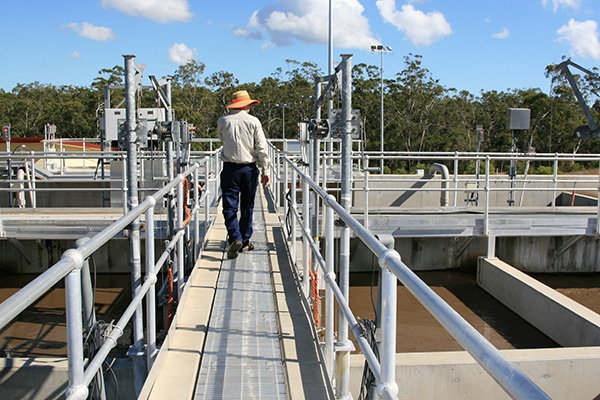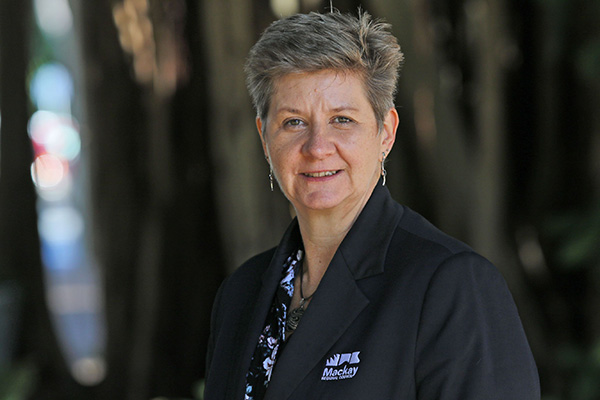We sat down with Dr Nicole Davis, the Chief Operating Officer of Water and Waste at Mackay Regional Council to chat about the Water Industry Worker Initiative, a program that was developed to help retain skilled staff and improve future opportunities for workers through industry specific training, funded partly through the Queensland Water Regional Alliance Program (QWRAP).
QWRAP is an industry-led initiative to investigate regional collaboration on water and sewerage services in regional Queensland. The program is a partnership between the LGAQ, DNRME, qldwater and over 30 participating councils with funding support from the Queensland Government through DNRME.
How did the Water Industry Worker Initiative come about?
The water industry initiative came around because we spend a lot of time in the water industry training our water operators at the treatment plant. There’s nothing to actually recognise the work that we do in our networks to protect public health, to protect the risks to drinking water… there’s nothing really that recognises the work that that team do, so we wanted to implement a water industry worker program. By reaching out to my neighboring councils and getting their trust and their faith that we could drive this forward, and with some State Government funding we were able to put on a project officer and we started the program.

QWRAP is an industry-led initiative to investigate regional collaboration on water and sewerage services in regional Queensland.
How does the program work?
So really this was actually building on the WIM water alliance (Whitsunday, Isaac and Mackay Water Alliance), which is the State Government-recognised alliance. It also reaches out to our CTM Alliance (Cairns, Townsville and Mackay) to actually just really build on a great partnership and collaboration approach. It’s a certification framework so that the workers will have the certification to work on different infrastructure. In the future, the partnership will allow us to share resources and build resilience. We can get someone from Cairns, Whitsunday or Townsville to support us
in Mackay when recovering from natural disasters and have confidence that they know how to work on the different infrastructure.
What are the benefits of the program?
As part of the program, we started a training module in Townsville, one in Mackay and one in Cairns. We all sent team members to each of those training modules in the different regions. There’s been so many unintended benefits of doing that – it actually gives them access to the processes and procedures of other councils, what other councils and colleagues do and they’re picking up a whole heap of new skills and also new information and new ways of doing things. So, they are bringing back great suggestions and business improvements for our businesses; they’re all learning from each other and it’s been a great networking opportunity. Another benefit is that it opens up secondment opportunities. If I have a long-term vacancy I might have an opportunity to fill it from Mackay, Cairns, or Townsville or the Whitsundays for a secondment. It really helps us with resilience, it helps us with skills and skill sharing across the whole of the northern east coast region, so it just provides an awful lot of flexibility. The program is a way to cross-skill, to give better resource flexibility and to give our staff a career path and confidence.
Without QWRAP I don’t think that people would think about collaborating as much. It gives incentive to councils to work together.
Can you tell us a success story from the program?
One of the proudest moments was when one of the staff came back from one of the training modules in Townsville and he came into my office and said, ‘I know all about chlorine now and I know exactly why it’s important’ and that’s a pretty fundamental skill to understand why chlorine in a distribution network is so critical for the protection of public health. He was so excited, and he said ‘can I go and talk to the scientists at the lab’ and I said ‘of course’. Next thing I know I was driving past the laboratory on my way to a meeting and I could see his truck parked there. He was in there; he was so excited to go and talk to a scientist about chlorine and about chlorine residual and about the environmental impacts of chlorine. That was just such an exciting and pivotal moment.
Why is it important for the water industry to have partnerships like WIMMA and also QWRAP?
Without QWRAP I don’t think that people would think about collaborating as much. It gives incentive to councils to work together. Most of us have tried one thing or another to solve our problems or implement some improvement, why reinvent the wheel? We may as well learn together. I think QWRAP really does provide that framework and support and actually encourages water businesses to work together. It has been a great opportunity to help with the collaboration and foster that collaboration between our councils because small regional councils really need each other to support each other because there’s only so many resources to go around and we may as well learn and share off each other.

About Dr Nicole Davis: Dr Davis’ career has spanned across the private and public sectors within infrastructure and environment including more than 27 years working within the water industry. Dr Davis has a PHD in science and has held positions with the Department of Health, GHD, SEQ Water Grid Manager and the Queensland Water Commission.